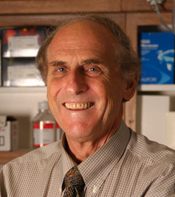Ralph M. Steinman, M.D.

Brief Bio
Ralph Marvin Steinman was born on January 14, 1943, in Montreal and grew up in Sherbrooke, Quebec. After receiving his B.S. from McGill University in 1963, he earned his M.D. from Harvard Medical School in 1968. A lecture on macrophages at Massachusetts General Hospital, where Steinman completed his residency, stimulated his interest in the role of accessory cells in immunity. He soon decided to pursue a career in the burgeoning field of cell-mediated immunity, and, in 1970, he accepted a postdoctoral fellowship to work with Zanvil Cohn (AAI '62) and James G. Hirsch (AAI '62) at the Rockefeller University.7 It was with Cohn that Steinman co-authored the 1973 study announcing the discovery of DCs. In his retrospective in the Annual Review of Immunology, Steinman praised his colleagues at the Rockefeller University, where he spent his entire career, and claimed that his own research would not have been possible without their contributions.
In addition to conducting research, Steinman served as a consultant for several organizations, including the Charles A. Dana Foundation, the University of Toronto University Health Network, and the National Institute of Allergy and Infectious Diseases Special Emphasis Panel, Centers for AIDS Research.
An avid hiker and jogger, Steinman was regularly seen carrying his jogging shoes to meetings, symposia, and other events. He also enjoyed skiing and took advantage of Colorado's Keystone Symposia to enjoy time on the slopes, often with his family—wife, Claudia; two daughters, Lesley and Alexis; and son, Adam.
Steinman died in Manhattan on September 30, 2011, of pancreatic cancer. His death occurred just three days before his Nobel Prize was announced.
Nobel Prize in Physiology or Medicine
2011 Nobel Prize in Physiology or Medicine “for his discovery of the dendritic cell and its role in adaptive immunity.”
Bruce A. Beutler (AAI '06) and Jules A. Hoffmann shared half of the award “for their discoveries concerning the activation of innate immunity.”
Lasker Award
2007 Albert Lasker Basic Medical Research Award “for the discovery of dendritic cells—the preeminent component of the immune system that initiates and regulates the body's response to foreign antigens.”
Click here for more details.
AAI Service History
Joined: 1975
Committees
Nominating Committee: 2003–2004
Nobel Prize in Science
Ralph M. Steinman was awarded the 2011 Nobel Prize in Physiology or Medicine for his discovery of the dendritic cell and its role in adaptive immunity. The Nobel Assembly in 2011 divided the prize among immunologists, granting Steinman half of the award and naming Bruce A. Beutler (AAI '06) and Jules A. Hoffmann to share the other half for their discoveries concerning the activation of innate immunity.
Steinman first noted "a novel cell type in peripheral lymphoid organs" in a study on mice in 1973. After identifying and purifying the cells, which he referred to as dendritic cells (DCs) for their resemblance to trees, he observed their high expression of major histocompatibility complex molecules. Once Steinman turned his attention to the mixed leukocyte reaction, he discovered that DCs were potent stimulator cells.
Steinman's discovery of DCs opened an entirely new field of research, and DCs were soon found in a variety of animals and organs. Still, the low density of DCs in tissue meant a relative scarcity of DCs for researchers' use in experimentation. In the 1990s, however, Steinman's group and others devised laboratory culture methods to produce large supplies of DCs, making them widely available. Since then, hundreds of researchers worldwide have studied DCs and their role in immune regulation.
"The relevance of immunology to so many disease states is not something one just mentions in a search for grant funds," Steinman said. "Instead, it is a thrilling, driving, force for choosing which experiments and experimental systems to pursue." Steinman's work identified DCs as the most powerful cell in the instigation of the T cell response, and this knowledge has driven many diverse discoveries throughout the field of immunology. "No one had anticipated that any cell could so efficiently goad T cells into action," said Joseph L. Goldstein, Nobel laureate from the University of Texas Southwestern Medical Center and chair of the committee that awarded Steinman the Lasker Basic Medical Research Award in 2007.
One of Steinman's many discoveries relating to DC activity in normal immunity and disease states was the role these cells played in AIDS proliferation. He was among the scientists who found that DCs actually protected the AIDS virus, thus helping to spread HIV instead of killing it. His work also revealed much about the role of DCs in eliciting and modulating T cell immunity, the unique characteristics of DC subtypes, and DC involvement in tumor immunity.
Awards and Honors
- Max Planck Research Award, 1998
- Member, National Academy of Sciences, 2001
- Member, Institute of Medicine, 2002
- Novartis Prize in Basic Immunology, 2004
- Gairdner Foundation International Award, 2004
- Corresponding fellow, Royal Society of Edinburgh, 2005
- Lasker Basic Medical Research Award, 2007
- Nobel Prize in Physiology or Medicine, 2011
Institutional/Biographical Links